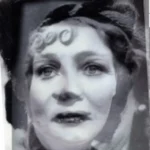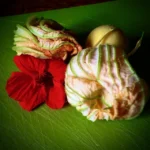This chapter begins in the ex-Royal Navy town of Porthampton, specifically its train station. It is concerned with our protagonist’s souring relationship with his remaining blood relative: the vile Aunt Bernadette.
What went wrong with this chapter? It’s a jumble. It’s two chapters maybe three. For some reason I wrote about Laurie’s (our mulit-gendered/sexed protagonist) early love life before bursting into the Bernadette description.
Laurie’s first-love story had been brewing on paper and in my head for a few months. In reality, I should have given these two elements (love and hate) more air between them.
Also, lines such as “Fuck it. Fuck it all. Memory is not the boss of me. Fuck you”, I said to little me in a way that sounded exactly like little me”, should never have seen the light of day.
Now, here’s the kicker. Originally chapter was set in Dublin and a small town modelled on a place called Fethard-on-Sea. I’m learning Irish you see, to go with my new Irish passport and naturalisation.
A lesson learnt here is that actual life events can seep into the work, become distracting, and eventually disintegrating of the main plot.
“Write what you know… except when it interferes with the entertainment value”.
I got off the train and walked across the concourse of Porthampton’s huge main station. I kept my head down. You never know who might recognise or remember you from some bad time in your life. The station had been cleaned up, modernised and heavily technologised since last time I was there.
I was been sixteen years old, drunk on sweet cider and stolen cigarillos. I had been in love with someone, someone grand, my dream, my first love. I was running away from them and from my family. I wore a lot of black eyeliner, my hair was dyed black, my clothes were black and dark purple and dark, blood red.
Dark music was branching through me from my cheap, bright orange foam headphones. It was September and I smelled diesel oil, and a place with Saturday evening tension. The clouds were ganging together and whispering as they came in from the sea ready for a fight.
My first love – obviously also my first broken spirit, trashed soul, devastated heart – had turned out to be less fairy tale prince and more a filthy, angry drunk in their fifties who borrowed money on a no return basis. He used this to stand his round and to get us both high. He would then call himself a generous fella. Then he’d take me back to his flat and submit me to what he called ‘good hard healthy sex’. My first love called me his toothsome teen – that was the word he used, that word ‘toothsome’.
At the height of the one-sided romance I decided it meant to be eaten alive. That man knew that my looks could be turned into a very palpable (he taught me a lot of words; no right meanings though) profit for both of us. I agreed with all the knowledge and experience of a 15 year old. His penchant, his predilection (him again) for young flesh like my own perfect skin was, he told me, was so he could pretend it was his own. Relive his youth. Understand the young. Empathise. We met at a bus stop near a red post box. My first broken heart came just after a French cigarette and my first court appearance – his fault. After him there was nothing special about being in love.
As I waited for a train to take me away, I pickpocketed a student-looking lad more drunk than I was. I got just enough cash for a ticket to Paris and some fags. That was decades ago.
The station brought all that back in pieces, so I found a shop that looked like it had what I needed immediately. I popped in and bought a portable music player and a selection of funk, disco, hiphop, punk and Mahler if I needed him. I grabbed a copy of the first broadsheet that came to hand, and hopped on the first train going up and right – everything stopped at Crosschester. Leaving Porthampton was not like leaving Paris, New York, LA, Melbourne, Akra… it wasn’t like leaving anywhere else because it was a place that had impaled me young. Unlike those other places, I had no choice in the onslaught of its memories, rough and painful like its rocky, pebbled beaches. Those other places could be treated as passing fads, drug pasts, drunk pasts, working pasts, made-up pasts. Not Porthampton.
I realised that Crosschester and the villages that suckled it were more cinematic, more ingrained, more terrifying during a bright summer’s day than any of those other places could be on a winter’s night.
“Fuck it. Fuck it all. Memory is not the boss of me. Fuck you”, I said to little me in a way that sounded exactly like little me.
A train pulled in, going in the right direction so I got on. After a few minutes it grunted and complained and made its way out into the weak sunlight. I had two seats to myself. I tried to read the newspaper and let the countryside stutter by the dirty, scratched-up window.
I finished the crosswords and tried to read the newspaper but I couldn’t settle to it. Nothing seemed that important to me. Terrorist threats, popstar romances, housing shortages, murders, adorable three legged puppies, recipes with far too many ingredients. It wasn’t as if I’d missed any of this while I was locked up. If you wanted to stay up to date with life outside, you could. I did. So, instead, I returned to the undulations of the county’s green countryside obfuscated in places by angry looking hawthorn bushes, in others by industrial units, in others by matchbox houses until I fell to thinking about Bernadette.
I used to like her a lot, I mean a lot, almost like a lovely, cuddly aunty. People said that we were so very much alike. This is when I was about ten years old and still a way from blossoming let alone fruition. All the way back then we both liked making other people laugh. We could both sing a little, dance a little. We put on performances at Christmas: we played a ventriloquist’s dummy and the ventriloquist.
Two shows for the festive period, one on Christmas Eve, one on Christmas Day afternoon. We switched roles. These cute entertainments were not for the sake of pure amusement. The dummy would cruelly tease people watching. We performed for us rather than for the audience. We would mess up horribly and then simply roll it seamlessly into the show – we knew that the gawping faces would never notice. If anything it illustrated our amazing theatrical skills. We shared a general feeling that the rest of the world was just an audience. We never discussed this. We knew it. My take-away from it was how to turn this audience into a paying one. Aunt Bernadette just wanted the attention.
We grew apart as age withered her and strengthened me, by the time I was thirteen, we were inimical to each other in the world. I remember the day. I was fourteen and she was 150 years old. I had been dropped off for my monthly visit. We were eating lunch and I asked something innocuous about God. Something trite I’d picked up at school that sounded amazing.
“Can God create something he can’t understand?”, I helped myself to some more summer pudding.
“Of course not. God understands everything”, she sipped some port.
“So, God can’t do something then?”
“There is nothing God can’t do. You know this Laurie”.
“He can create evil”.
“No, that is Satan’s role”.
“So, there are two things God can’t do. He can’t create something that he can’t understand because he understands everything. And he can’t create evil because the Devil does that”, I sipped from my Coke. I felt good.
She stabbed at a block of sweating Stilton with the end of her steak-knife.
“We cannot understand God!”, she yelled, exasperated that I was missing such an obvious theological point.
“You can say the same thing about lunatics, Bernadette!!?” I yelled back, having become fascinated with lunatics as any teenage boy does.
“Have some bloody respect. I am your AUNT Bernadette!”, she roared.
She rose from the table like an avenging angel rising from the corpse of a heretic terrified to death and to Hell. She grabbed a whiskey bottle by its neck, and a heavy crystal glass, she took her cigarettes and stormed out into the garden. I had to laugh. Don’t get me wrong, each to their own beliefs, the more the merrier in fact, but fucking hell, I ask you, really.
She stayed in the garden, puffing and chugging away until my foster parents came to pick me up. They all had a conversation out there. Bernadette raving and gesticulating, fag-handed and engaged, my meek fosters nodding and shaking their heads sometimes at the same time.
When we finally made it into the car, my foster father turned around to me, I was sunk in the backseat reading about lunatics.
“Are you ok, Laurie?”
I nodded, and sniffed, not looking up. Of course I was okay, stupid questions. I turned the page. We drove home and I went up to my room. I heard them downstairs, below my bed, muffled discussions, one of them crying. I slept ok that night.
After that day Bernadette stopped talking to me in anything other than holier-than-thou platitudes, threats of agonising afterlives, and drunken mumbles. I stopped talking to her entirely. I stopped visiting her in her small, fag smelling house in Commiton just outside Crosschester.
A few years or maybe a decade later, the foster parents told me that Bernadette had retired early (“Maybe you’d like to send her a card?”, “Nah, you’re alright) from a dowdy job in one of the civil services. Her father – a grandad I never met because, well, I just never met him – had left her a decent sum of money and the mad old big old Georgian house in Shalford village.
She settled into two or three rooms of the house to drink whisky, smoke tobacco and eat next to nothing but fridge cakes, hot buttered toast, and honey-roast carrots with sweet chilli sauce. Shortly after the local doctor, hectored for painkillers, had diagnosed her with diabetes she recruited Julianna who moved in as her companion.
I was in Shalford at the time having run away from my first love. I was trying to touch a few old – I was seventeen! – school friends up for funds with no success. I had decided to run away to Europe, so I thought I should say goodbye to Bernadette, my surviving blood relative. Wealthy, surviving relative. That was the day I met Julianna.



